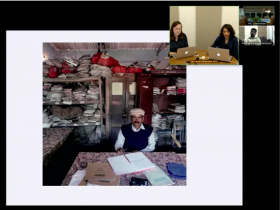Big data has huge potential – it can help track diseases, make government more efficient, or allow businesses to better understand their customers.
In a SAI webinar titled ‘Who owns Big Data?” on October 13, Malavika Jayaram, Fellow at the Harvard Berkman Center for Internet & Society and Visiting Scholar at the Centre for International Security Studies and the Sydney Southeast Asia Centre, The University of Sydney, addressed the potential concerns for big data in developing countries, using videoconference software provided by the Higher Education Commission of Pakistan.
Jayaram explained that big data, the massive amounts of information now available due to technology, should be approached differently in the developing world compared to the West, where big data is a hot topic in academia and the media.
In developing countries, Jayaram warns that we should embrace the potential while being cautious of unintended consequences. “Metaphors about data are everywhere: deluge, tsunami, avalanche, oil,” she explained. “It implies that there is something natural about it [data], yet uncontrollable – human beings can’t manage it, and it doesn’t always behave the way we expect.”
Especially in Asia, Jayaram explained that “governments are so keen to be up to speed on technology, and roll out the next big thing. I’m urging a little bit of nuance and thoughtfulness as a useful way to approach these developments.”
A common theme related to technology advances, Jayaram explained, is that machines and computers are neutral and objective – and therefore, the findings from big data are unfiltered conclusions. However, Jayaram cautions that this is not necessarily the case, especially in countries that are prone to corruption.
“Behind every one of these machines is a human who is writing the software, making certain design choices over others,” Jayaram said. She explained that technology is often presented as a solution to many problems – and rightly so – but does not always take into account the socio-political-economic considerations of a particular society.
Jayaram explained that the growing field of big data should address the “digital divide.” While digital tools like mobile banking have huge potential for bringing services to people in developing countries, this financial inclusion could be leaving people out who now cannot access services that were previously conducted in person.
“When you have an information or technology asymmetry, you have power divides and imbalances,” Jayaram said. “In trying to provide equality, are we treating people differently?”
In developing countries like India, big data should raise concerns about vulnerability for certain populations, who Jayaram refers to as the “weakest links.” Often, people in control of the systems that use big data receive the most benefits, while the “subjects” of big data are most vulnerable. “If you’re not paying, you are the product,” she said.
Jayaram warned of the potential of a “creeping surveillance society,” in which governments start to watch and collect data that seems innocuous, even from people have not done anything wrong. As people become more accustomed to the gathering of this data, it becomes harder to fight it when it is starts to be used against them.
Companies like Facebook are able to use big data to personalize a user’s experience – for example, a person’s news feed will only show stories related to their political point of view, based on past articles viewed by the user. But this is not necessarily a good thing, according to Jarayam.
“The marketplace of ideas that is so integral to a democracy – that we should be free to listen to not just views that we agree with, but to things that we don’t agree with, is precisely because they help educate us and help us understand the society that we live in and where the other side is coming from,” she said. “If we don’t know how people think, we are unable to have empathy towards their point of view.”
Moving forward, Jayaram emphasized that academics, policymakers, business leaders, designers, and users must come together to maximize the positive outcomes of big data and better articulate the potential harms.
“Try to minimize these risks when creating systems to harness all of the wonderful things big data can do,” Jayaram said.
Watch the webinar here (recommended browser is Internet Explorer.)
The next webinar, Mobile Health at the Nashik Kumbh Mela, will take place on November 17.
Resources:
Data is the New “___” by Sara M. Watson
Jan Banning Photography: Bureaucratics
Jennifer Lyn Morone, Inc becomes an incorporated person
Hasan Elahi: Tracking Transience
-Meghan Smith


